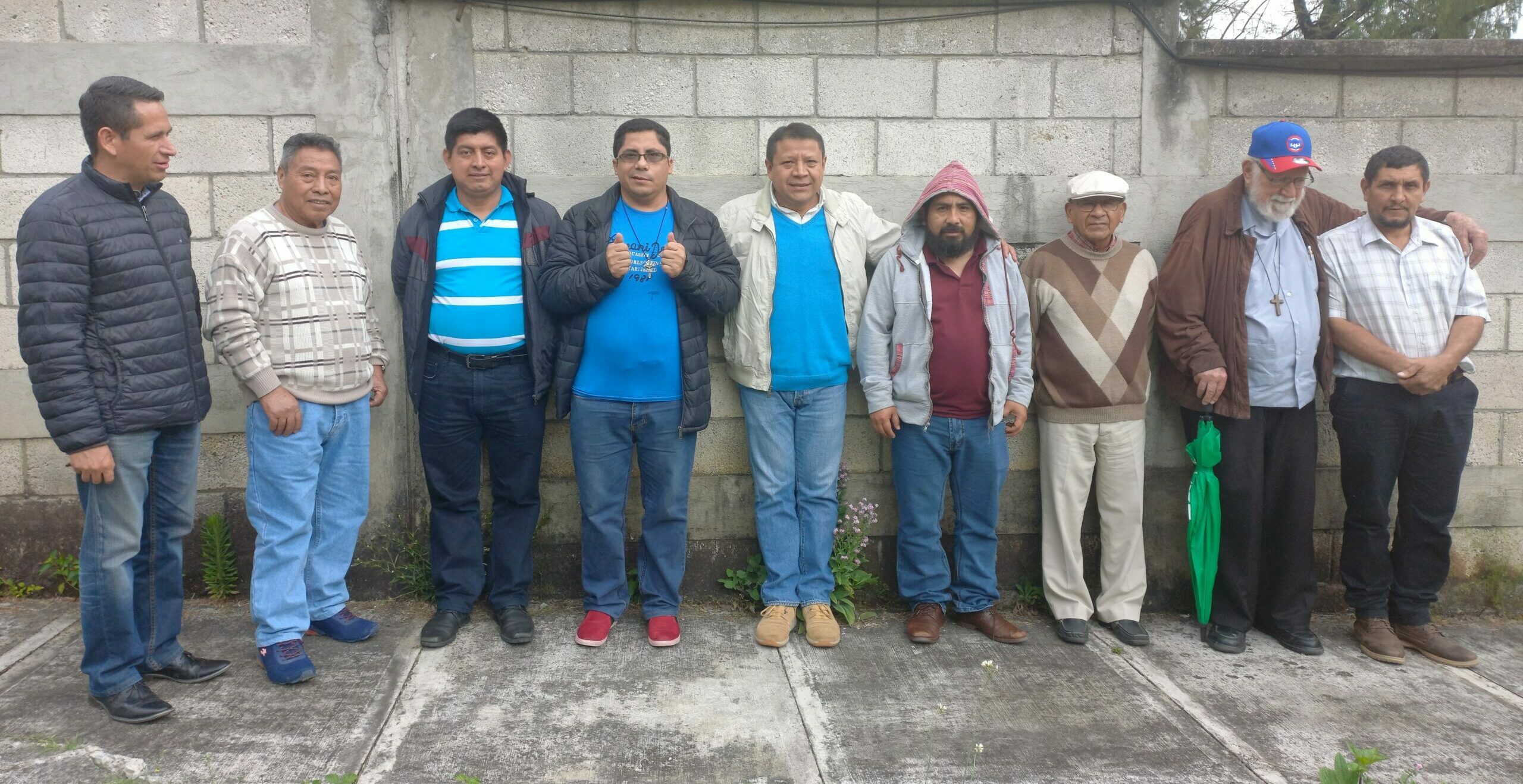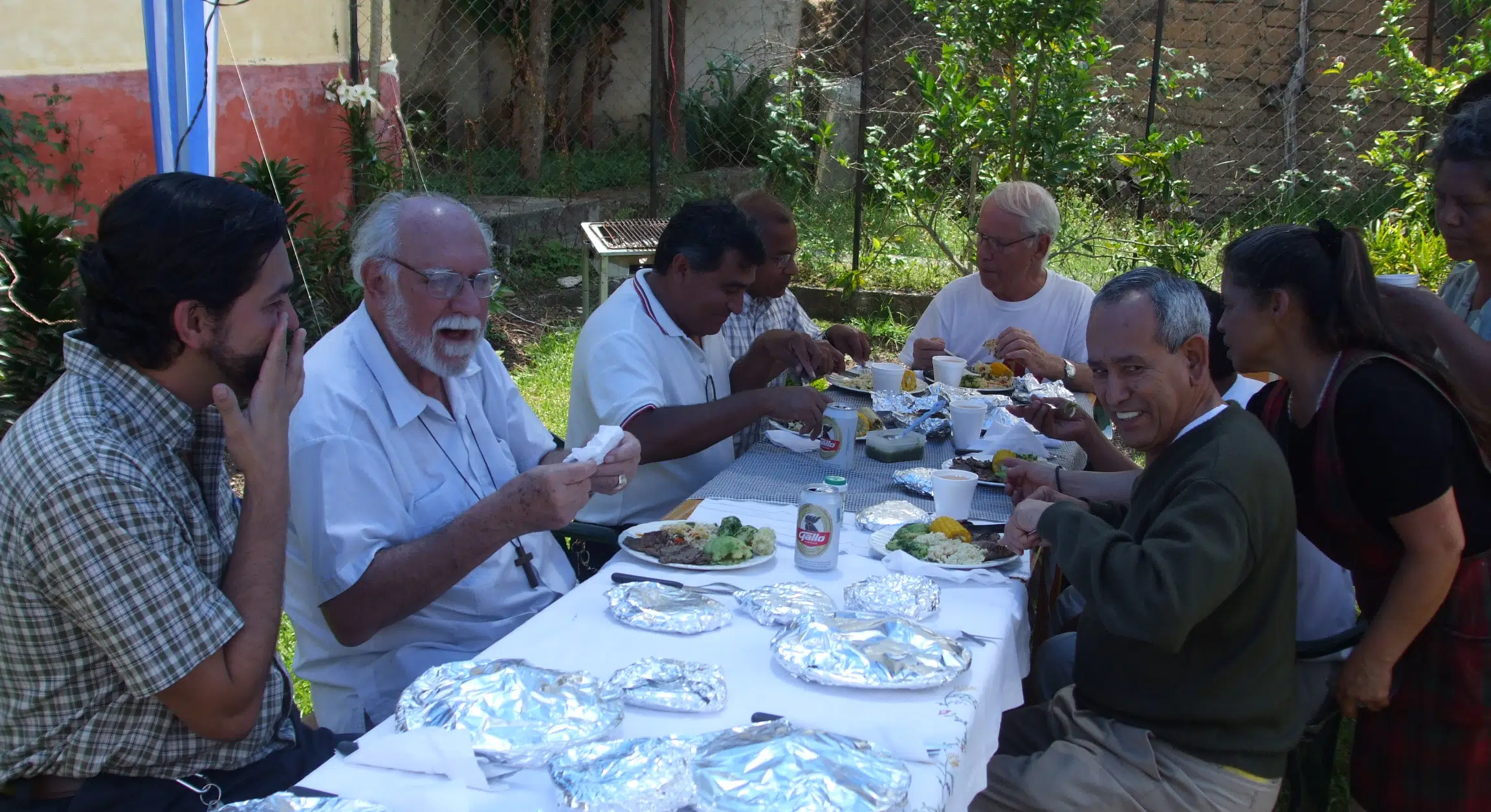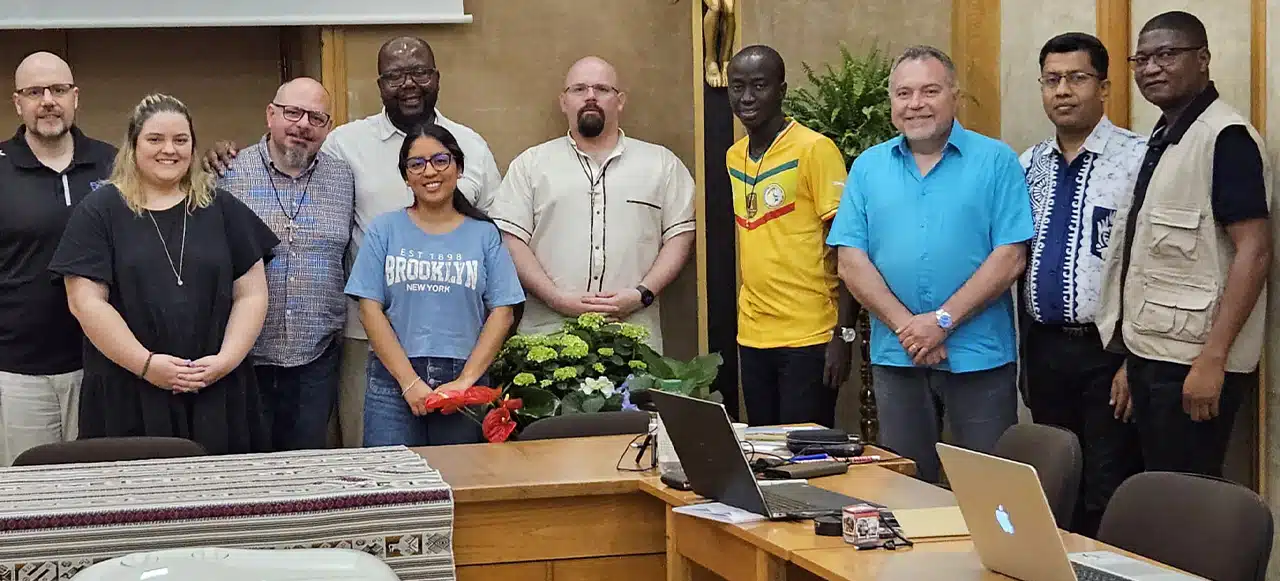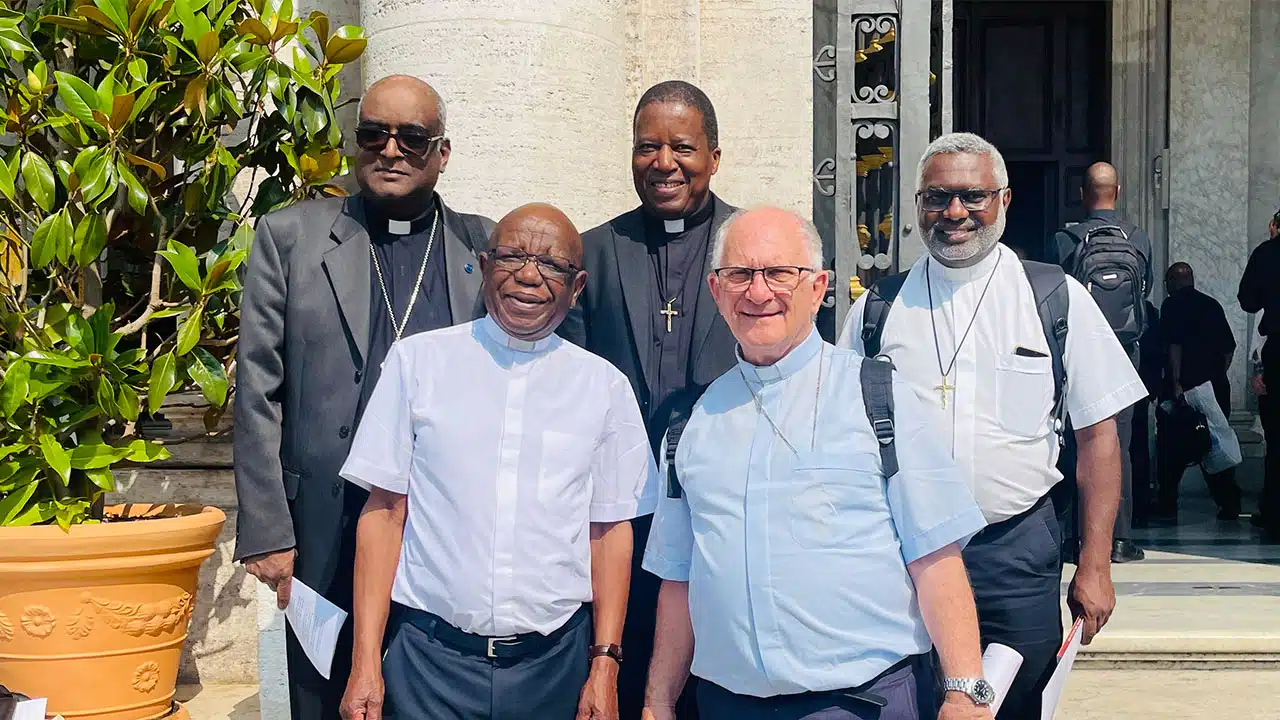Félix García, OMI (Delegation superior)
By faith Abraham obeyed when he was called to go out to a place that he was to receive as an inheritance; he went out, not knowing where he was to go. By faith he sojourned in the promised land as in a foreign country, dwelling in tents with Isaac and Jacob, heirs of the same promise. (Hebrews 11: 8-9)
We want to express our gratitude to the Lord of life and of history who has allowed us, for 35 years, to be part of this pilgrimage with his people in these beautiful lands. We also thank all those sons of Saint Eugene de Mazenod, who, like Abraham, set out, and with their presence and missionary commitment, have left their mark in history and in the lives of many people and communities.
The story of this journey cannot be told without the committed presence of the laity, men and women of faith, families, young people and children, who have been part of it as catechists, celebrators of the Word, promotors of health, ministers of the Eucharist, trainers of pastoral workers, Oblate laity, animators of Ecclesial Base Communities, and of ecclesial movements, as well as the consecrated religious who are pilgrims in these lands, and with whom we have shared this path together in the life and faith of our people.
All pilgrims have an ideal -a compelling idea-that sets them in motion towards the Goal.
Thus, on 2 July 1988, the first 5 Oblates arrived in Guatemala to share life and faith with the people of the diocese of Quiché, one of the regions most affected and hurt by the internal armed conflict that lasted from 1960 to December 1996. This group of intrepid, far-sighted young men from Peru, Mexico, the USA and Argentina (Pedro, Héctor, Daniel, José Alberto) led by Fr. Gerardo Kapustka, “the old man,” took over the first 4 Oblate parishes, in the municipalities of Sacapulas, Cunén, Uspantán and Chicamán (currently we are present only in Chicamán).
When reopening the churches and parish houses that were quite deteriorated, since they had been used as military barracks or clandestine detention centers, the Oblates compared their apostolic labors to the small beginnings of our congregation at the time of the Founder. Their main ministry was visiting small, impoverished rural towns, far from medical centers. The rate of illiteracy was high. Malnutrition had left its mark. The abandonment of the churches and of religious practice due to the fear of nearby bombardment, the lack of trust: these were daily elements with which the newcomers would have to work, in addition to their ignorance of the native languages. But they were sustained by their faith experiences, their community meetings and the desire to live and accompany this suffering people with the creative force of the Gospel.
However, the lives and dreams of the Oblates in those first years were strengthened by the people’s quick response; by the presence of those engaged in pastoral tasks; by the values of sharing in solidarity; by the desire to form reconciled families and communities; by the desire to live a dignified life, to celebrate faith and life. Another valuable element in going through this stage was the support and closeness of the diocesan bishop, in addition to several native priests and nuns, who had maintained their presence, their closeness in the life of the Quiché diocese. They gradually helped the Oblates to live in this persecuted, martyred and prophetic Church, which strove to live communion and participation, and which longed to live the yearned-for Peace.
During those first years, there was the opportunity to help rebuild the life and hope of the people that had been fractured by the internal armed conflict. It was a great opportunity to develop listening skills and learn, as far as possible, other languages, other ways of community organization and to share Oblate spirituality. For several years our way of being pilgrims of hope in Guatemala has been through sharing the Gospel in missionary communities by visiting and spending time with families and communities that had suffered the reality of violence. We accompany them in the search for justice and in the knowledge of their rights.
This has entailed a great effort to incorporate into our objectives and pastoral plans spaces for listening, where we learned to take time to share life with people, with the communities to which we have been sent. In the rural areas, community celebrations, including the Eucharist, conclude with joyfully shared coffee, atole [a sweet corn-based drink], tortillas and food contributed by each family.
In response to the formation needs of the new Oblates in our region (Latin America), in an environment that will help them live and engage in their discernment of the Oblate missionary life, with the approval of the Archbishop of Guatemala City and our Superior General of those years, Fr. Marcelo Zago, the new Latin American María Inmaculada Novitiate, started in 1994 on the outskirts of the city.
In that same year, after an evaluation and community discernment, in order to meet the challenges of the Diocese of Quiché according to our charism, three Oblates decided to commit themselves to the pastoral care of the Cristo Redentor parish, in the jungle region of Ixcán (on the border with Chiapas, Mexico). Once again, the task of listening, accompaniment and formation in the care of the environment; the defense of human rights; catechetical formation; theological-pastoral reflection; and comprehensive health care continues. This has been our way of accompanying the people and communities of this region for 25 years.
This apostolic work was shared with other men and women religious and diocesan priests. Some of these towns were made up of people who had fled the internal armed conflict in Mexico and who, like in the stories of the People of Israel, told in the Old Testament, returned to start over from scratch, to rebuild their lives and hope in their homeland, equipped only with their dreams and their experience of faith that had sustained them during their time in exile. Also at this time, some young aspirants to Oblate life knocked on our doors to respond to the Lord’s invitation to start a formation journey, a reason for joy and hope for our missionaries who gladly opened a vocational house.
In 1997, faced with the needs of pastoral care for the residents of the San Ignacio neighborhood, the Oblates asked the archbishop to take charge of part of the parish of Our Lady of Belen. Thus, the quasi-parish of Santa Cecilia was born, in today’s populated zone 7 of Mixco, which together with the novitiate and the central house have witnessed the great growth of this part of the city and which we continue to accompany to this day.
A difficult and painful event experienced in these years was the one that happened on 18 May 2008. On the route between Alta Verapaz and Playa Grande, Quiché, during an armed robbery, Fr. Lorenzo Rosebaugh, OMI, who was driving a minibus with most of the Oblates from Guatemala, was assassinated. In this incident there were others injured who fortunately were able to recover. The expressions of solidarity, the affection of the communities, the closeness of the brothers, the search for justice, and community prayer were vital so that despite the violent death of Fr. Larry, it was possible to celebrate the new life and the forgiveness that springs from the Easter experience. Today, Fr. Lorenzo continues to inspire the new generations of Oblates to be generous, courageous and risk-taking in the context of our pilgrimage today.
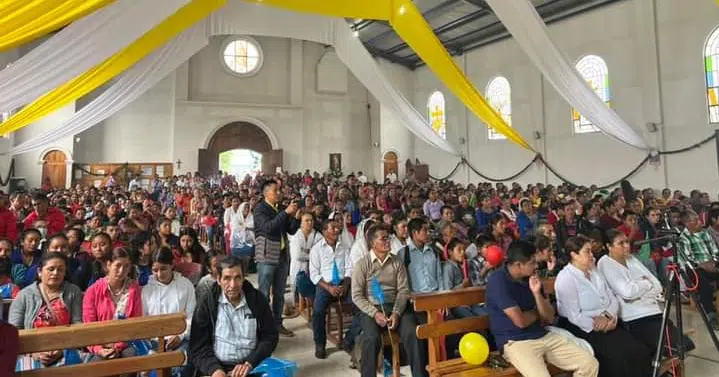
In March 2018, after a process of several years, we managed to open the San Eugenio de Mazenod Comprehensive Health Center “FUNVIMA”, a place that attends to the comprehensive health needs of residents and other people who pass through this area. It is an experience where the Oblate Lay Family collaborates actively. Many of the initiatives are motivated and directed by them in coordination with the brothers who work in the Delegation. At this center, many people have found support for their physical, spiritual or psychological health. Here, parents of the children who enter the nutrition programs know that they will have a different future. Here they can live a day of spiritual retreat and there is also a space for recreation and parties.
What lessons have we learned from these 35 years of pilgrimage in these lands and what challenges are we missing to deal with today’s reality?
“What more sublime purpose than that of their Institute? Their founder is Jesus Christ, the very Son of God; their first fathers are the Apostles. They are called to be the Saviour’s co-workers, the co-redeemers of mankind; and even though, because of their present small number and the more urgent needs of the people around them, they have to limit the scope of their zeal, for the time being, to the poor of our countryside and others; their ambition should, in its holy aspirations, embrace the vast expanse of the whole earth.”
Saint Eugene de Mazenod 1818
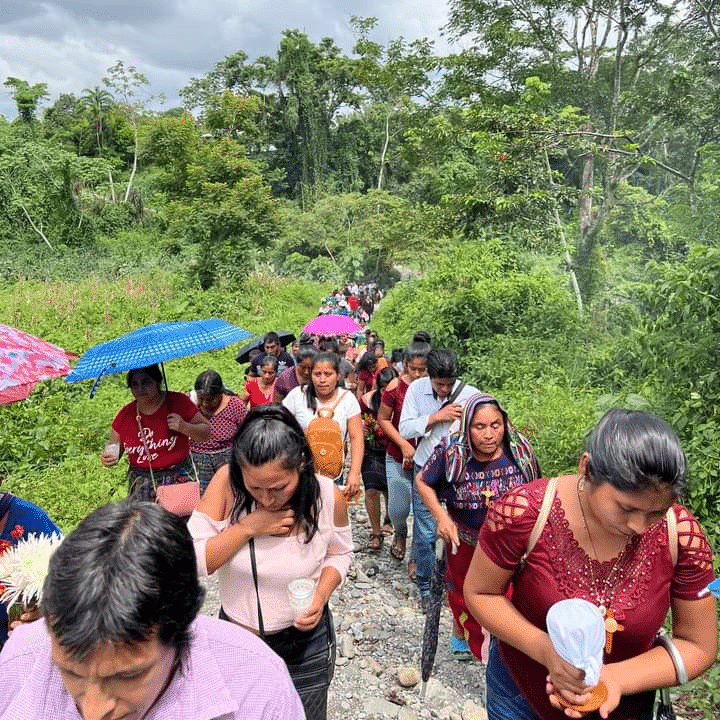
We also want to maintain an openness in each community to our Oblate brothers and to the members of the Mazenodian family who wish to live and share these dreams in these “chapinas” [Guatemalan] lands.
Although today we have several native Oblates, our Delegation has had the grace to build intercultural communities that have enriched it, since we have Oblates from various parts of the world: Canada, the United States, Mexico, Peru, Italy, Brazil, Belgium, Argentina, Congo, Poland. This has challenged us to expand our minds and hearts so that we all have a place in our communities. It has not been an easy road but we try to respond with our “yes,” every day.
Some Oblates who worked in the Guatemalan delegation during these 35 years have returned to their countries of origin; others left the priestly ministry; and some others are now at rest in the House of the Father. From there, they continue exercising their task so that we can continue this work which the Lord in his goodness has entrusted to us.
The response and commitment of the Oblate laity, who deeply live the following of Jesus, building ecclesial communities, makes us love and be present in the works entrusted to us. In addition, due to the presence of the novitiate in the Delegation, we have been able to meet and share with a large number of novices who are currently exercising their ministry in their respective units.
The Oblates of Guatemala are grateful for these first 35 years of presence and we wish to remain attentive to the calls of the Lord, to respond and be present “where life cries out” for a hope of salvation that only Christ can fully offer. We wish to continue accompanying the People of God, taking the risk of a missionary church, a community of communities, fraternal and synodal, so that from its smallness, from its origins, it continues to be a servant of the people of our time. Through the gaze of the crucified Savior, we see the world redeemed by his blood, with the desire that the men in whom his passion continues may also know the power of his resurrection (cf. Phil 3, 10). C.4 b.
We have seen our Good Mother as a pilgrim who walks and directs us to follow in the footsteps of her Son. She lives and transmits to us attitudes and encouragement to continue the pilgrimage in our land today, like many Guatemalan women, Mujeres del Alba [Women of the dawn], women of struggle, of courage and commitment to her people, who animate the lives of their families and their communities. To them who teach us to live the Gospel in an ever-new way, to these mentors and companions, goes all our gratitude.
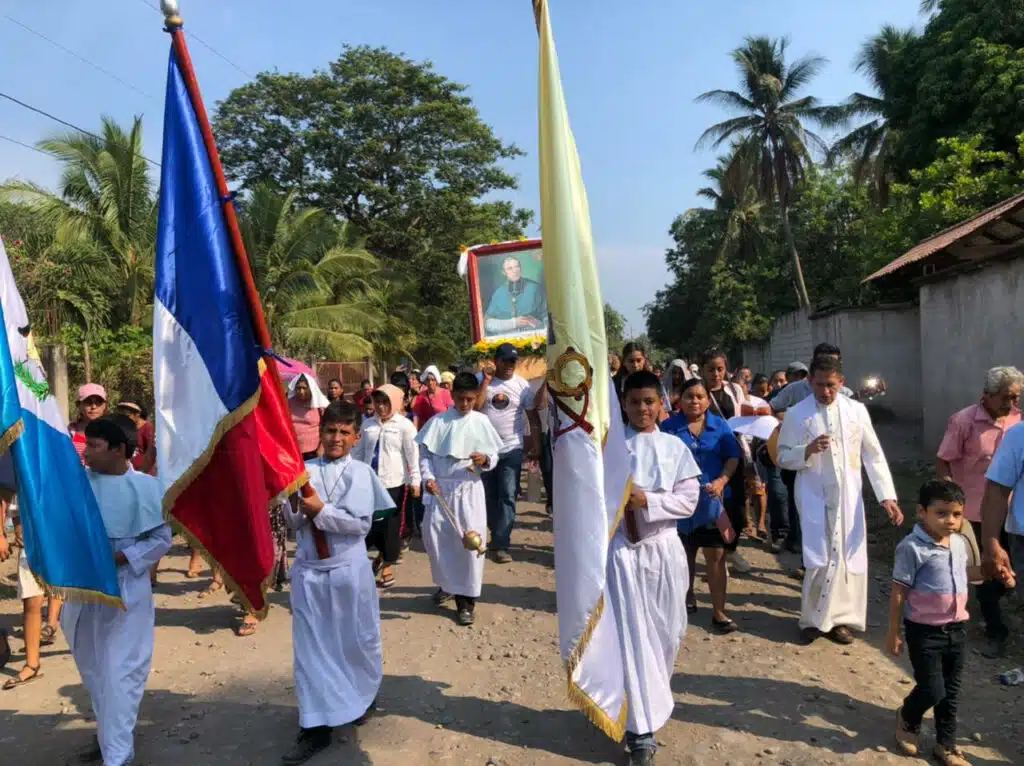
Click here for more photos

